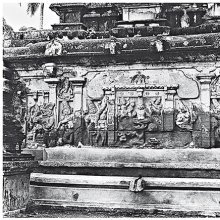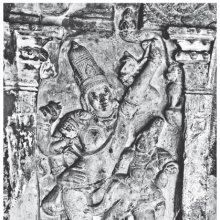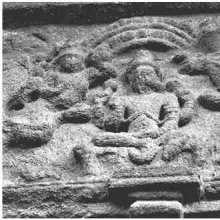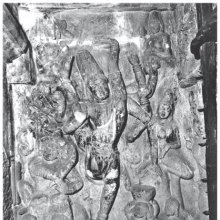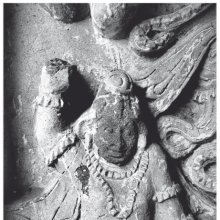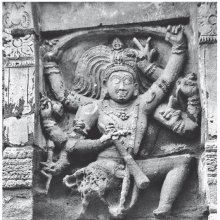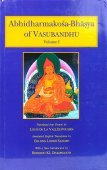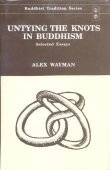De, Ḍē, Ḍe, Dé: 8 definitions
Introduction:
De means something in Hinduism, Sanskrit, Marathi, biology. If you want to know the exact meaning, history, etymology or English translation of this term then check out the descriptions on this page. Add your comment or reference to a book if you want to contribute to this summary article.
Images (photo gallery)
(+93 more images available)
Biology (plants and animals)
Source: Google Books: CRC World Dictionary (Regional names)1) De in Central African Republic is the name of a plant defined with Khaya grandifoliola in various botanical sources. This page contains potential references in Ayurveda, modern medicine, and other folk traditions or local practices.
2) De in Ivory Coast is also identified with Anchomanes difformis It has the synonym Sauromatum ferox Linden ex Engl. (etc.).
3) De in Mali is also identified with Sorghum bicolor It has the synonym Andropogon saccharatus (L.) Roxb. (etc.).
Example references for further research on medicinal uses or toxicity (see latin names for full list):
· Prodromus Plantarum Capensium, … (1794)
· Flora Lusitanica (1995)
· Genera Aroidearum exposita (1858)
· Nouvelles Annales du Museum d’Histoire Naturelle (1834)
· Pharmaceutical Biology (2006)
· Rumphia (1837)
If you are looking for specific details regarding De, for example extract dosage, side effects, health benefits, chemical composition, pregnancy safety, diet and recipes, have a look at these references.

This sections includes definitions from the five kingdoms of living things: Animals, Plants, Fungi, Protists and Monera. It will include both the official binomial nomenclature (scientific names usually in Latin) as well as regional spellings and variants.
Languages of India and abroad
Marathi-English dictionary
Source: DDSA: The Aryabhusan school dictionary, Marathi-Englishḍē (डे).—or-
Marathi is an Indo-European language having over 70 million native speakers people in (predominantly) Maharashtra India. Marathi, like many other Indo-Aryan languages, evolved from early forms of Prakrit, which itself is a subset of Sanskrit, one of the most ancient languages of the world.
Sanskrit dictionary
Source: DDSA: The practical Sanskrit-English dictionaryDe (दे).—1 Ā. (dayate, dāta, desid. ditsate) To protect, cherish.
Source: Cologne Digital Sanskrit Dictionaries: Shabda-Sagara Sanskrit-English DictionaryDe (दे).—[(ṅa) deṅ] r. 1st cl. (dayate) To preserve, to cherish or protect. bhvā0 ā0 saka0 aniṭ .
Source: Cologne Digital Sanskrit Dictionaries: Benfey Sanskrit-English DictionaryDe (दे).—i. 1, [Ātmanepada.] To protect.
— Cf. day.
Source: Cologne Digital Sanskrit Dictionaries: Monier-Williams Sanskrit-English DictionaryDe (दे):—[class] 1. [Ātmanepada] dayate, [Dhātupāṭha xxii, 66];
— [perfect tense] digye, [Pāṇini 7-4, 9], to protect, defend:—[Desiderative] ditsate, [54.]cf. 1. datta; 4. 5. dā.
Source: Cologne Digital Sanskrit Dictionaries: Yates Sanskrit-English DictionaryDe (दे):—(ṅa) dayate 1. d. To preserve.
Source: DDSA: Paia-sadda-mahannavo; a comprehensive Prakrit Hindi dictionary (S)De (दे) in the Sanskrit language is related to the Prakrit word: Kaṇayaṃdī.
Sanskrit, also spelled संस्कृतम् (saṃskṛtam), is an ancient language of India commonly seen as the grandmother of the Indo-European language family (even English!). Closely allied with Prakrit and Pali, Sanskrit is more exhaustive in both grammar and terms and has the most extensive collection of literature in the world, greatly surpassing its sister-languages Greek and Latin.
See also (Relevant definitions)
Starts with (+3777): Dead, Dead body, Dead finish, Dead nettle, Dead person, Dead sea apple, Dead sea fruit, Dead-and-awake, Deadly nightshade, Deaf, Deafness, Dealer, Dealing, Dearani, Death, Death camas, Death Consciousness, Death Proximate Karma, Death rite, Deathlessness.
Ends with (+2674): A-mede, A-nede, Aachadi gadde, Aadde, Aaloogedde, Aalugadde, Aaluthigade, Abade, Abhayaprade, Abhyude, Abiding, Acajou cede, Accagade, Accarivade, Accugambade, Adabade, Adade, Adagede, Adagimde, Adagode.
Full-text (+6953): Tekava, Tenkava, Tenka, Ambada, Gbegbe n'de, Dubakali, Shidakava, Tumani, Danki, Kodaga, Sataka, Dadi, Saikada, Kumhada, Pichavada, Tukada, Hastalaghava, Harimide, Devatagriha, Vaidyanathapayagunda.
Relevant text
One of your search terms exceeds the minimun character amount per search term. This amount currently equals 2.
No search results for De, Ḍē, Ḍe, Dē, Dé in any book or story.
Related products
(+1 more products available)
